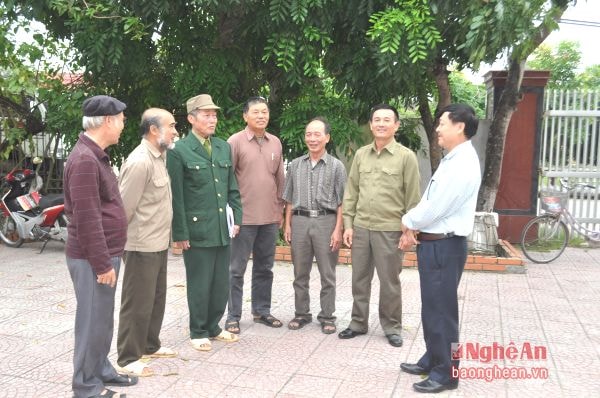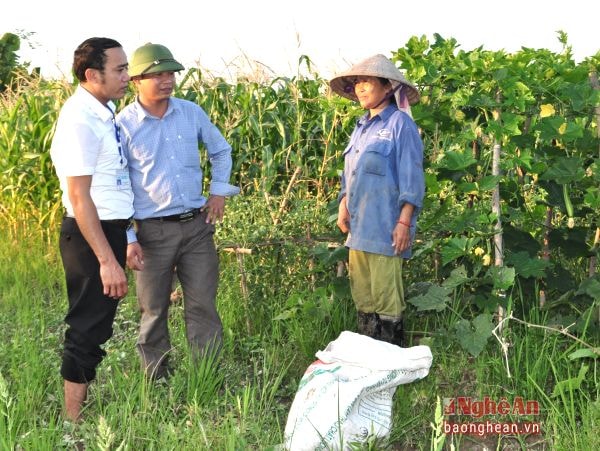It is necessary to build a dialogue regulation between the Party Committee, the government with Party members and the people.
(Baonghean) - Reality has been posing the need for Party committees, authorities, the Fatherland Front and organizations in the political system to innovate leadership, direction, management and implementation methods. And one of those measures is to strengthen dialogue with the grassroots and with the people to create unity and consensus to solve problems arising at the grassroots level...
Solve many problems that people care about
Quynh Luu is considered a locality with quite comprehensive development in terms of economy - society, national defense - security and Party building work, political system. In 2016 alone, up to this point, the basic targets set for the year have all been achieved; except for some targets that are still uncertain, such as reducing the poverty rate to below 3.8%; the rate of giving birth to the third child or more to below 18% and cultural and sports institutions. During the year, the district had 3 more communes recognized as meeting new rural standards, bringing the total number to 12 communes.
Comrade Hoang Van Bo - Standing Deputy Secretary of Quynh Luu District Party Committee, said: The process of leading and directing the implementation of political tasks in the locality inevitably has some difficulties and obstacles. Therefore, dialogue is an important measure that the Party Committee and the entire political system pay attention to in order to solve. Most clearly, in rural construction with the motto "using the people's strength to care for the people", discussion, democratic dialogue to create consensus and unity among the people to implement the 19 new rural criteria is a prerequisite.
 |
| Leaders of Quynh Doi commune (Quynh Luu) discussed with reporters about propaganda orientation to implement socio-economic targets. |
In Quynh Hong commune, many dialogues were organized based on some issues that people had questions, suggestions or did not agree with. For example, in the expansion of concrete roads, there were households that donated land and households that did not donate land, so the Party Committee and the government had to stand up to dialogue, listen to the thoughts, wishes and opinions of the people, and explain and clarify to the people the general policy: in the difficult conditions of local resources, it is necessary to have the accompaniment and support of each citizen.
Or from some people's opinions reflecting on the poor quality of the road to the cemetery, the Party Committee promptly had a dialogue to clarify, and at the same time requested the contractor to repair. Many dialogues also arose from arising issues such as land disputes, implementation of agricultural support policies, poor household assessment...
In Quynh Hong, in addition to organizing dialogues to resolve arising issues, when issuing a policy or resolution, the Party Committee also organizes dialogues with departments, branches, grassroots Party cells and the entire Party Committee to discuss, debate, and propose goals, targets and solutions so that when the policy or resolution is issued, it will "take root" deeply in life.
For Quynh Doi commune, the dialogue of the Party Committee is carried out through conferences to collect opinions from cadres, Party members and people with in-depth knowledge of the policies that the Party Committee will issue. At the same time, through regular and ad hoc meetings of the entire Party Committee, the Executive Committee, and the Standing Committee, many issues are also questioned and explained as dialogues, clarifying the responsibilities of organizations and individuals.
On the government side, meetings with voters are also considered broad dialogues, because the commune People's Council delegates are basically officials and civil servants at the commune and hamlet levels, so they can promptly respond to voters' suggestions and reflections. The commune People's Committee conducts dialogues related to state management in the fields of socio-economics, national defense and security.
In Thanh Chuong district, dialogue work is carried out in two forms: regular and thematic. Regular dialogue includes periodic meetings between the Standing Committee of the District Party Committee and departments, offices, the Fatherland Front and mass organizations and according to each content and field that the District Party Committee is focusing on leading and directing; meetings with secretaries of communes and towns; comrades in the Standing Committee participating in party cell activities in regions, agencies and units in charge.
Through these dialogues, the Party Committee clearly sees the difficulties and obstacles that arise in the process of implementing political tasks; from there, it orients and has timely solutions. This is considered a solution for cadres to be close to the people, provide information, propagate, orient the people, and create consensus.
The thematic dialogue focused on resolving cases; sensitive issues, "chaos" at the grassroots level; resolving complaints and denunciations of the people.... According to Deputy Head of the Justice Department of the District People's Committee Nguyen Thi Xuan: Through direct dialogue with citizens and groups and individuals who were complained and denounced; clarifying the rights and wrongs of each side, many long-standing cases have been resolved, contributing to reducing complaints beyond the level, limiting further complaints and denunciations.
Comrade Le Quoc Khanh - Deputy Head of the Standing Committee of the Provincial Party Committee's Organization Board, affirmed: In the process of leadership, direction and administration, Party committees and authorities from the province to the grassroots level have clearly recognized the need to strengthen dialogue with the grassroots and with the people to best resolve common issues.
Need to issue dialogue regulations
Although it has received attention, through practical research, we have found that the organization of dialogues at all levels has mainly stopped at meetings, conferences, and seminars that "contain" elements of dialogue, or dialogue to resolve arising incidents and problems, but there have not been many dialogues in the true sense.
 |
| Officials of Quynh Dien commune (Quynh Luu) discussed with people about winter crop production. |
In addition to the limited number of dialogues, the quality of the dialogues is also limited. According to comrade Nguyen Dinh Hien - Secretary of the Quynh Doi Commune Party Committee: The purpose of dialogue activities is to grasp information, understand the nature of the problem and fundamentally solve it. However, in reality, through a number of forums, especially the question-and-answer sessions at People's Council meetings at all levels - an activity that contains elements of dialogue, there is still a situation where delegates ask questions to seek more information; and the respondents "heavily" explain the documents without clarifying the responsibilities of the sector, department and themselves in relation to the issues raised.
Comrade Le Sy Thanh - Secretary of the Party Committee of Quynh Hong Commune (Quynh Luu), admitted: There were unsuccessful dialogues, and the people did not accept the solutions proposed by the Party Committee and the government. Some "post" dialogue issues were difficult to resolve due to exceeding authority or due to problems in some regulations that were not suitable for reality. This affected the quality and effectiveness of the dialogue.
Referring to another perspective, comrade Dang Anh Dung - Standing Deputy Secretary of Thanh Chuong District Party Committee, said: If not careful, organizing dialogues can become a "forum" for individuals to make long-term complaints and denunciations. There is a situation where some people who often express their opinions at voter meetings are also speakers at dialogues. This leads to limited grasp of information and new issues by Party committees and authorities.
In addition to the above limitations and difficulties, currently, Party committees at all levels are still confused in choosing and determining the form and content of dialogue on Party building topics such as personnel work; inspection and supervision work; ideological work; mass mobilization work; Party member development work... Some Party committees are still hesitant and not bold enough to organize dialogues.
On the other hand, Party committees at all levels consider meetings between the upper-level Party committees and the heads of the lower-level Party committees; the Party committees with the heads of departments, branches, sectors, fields, etc. as "representative" dialogues; there are no direct dialogues within the Party (dialogues with all Party members in the Party organization). This limits the ability to grasp the true nature of ideology and public opinion within the Party in order to focus on research and timely handling.
From the limitations, many opinions suggest that it is necessary to issue clear and specific regulations and methods of dialogue so that the Party Committee and the government can identify this as a regular activity and improve the quality of dialogue. Pay attention to building a culture of dialogue on the basis of mutual respect and the rule of law for the common goal.
Focus on improving the quality and effectiveness of dialogue by directing the decisive resolution of post-dialogue issues, rather than dialogue just to detect and clarify issues and then leave them there.
At the same time, pay attention to improving the quality of the team, organize dialogue training for the team of leaders and managers at all levels, especially at the grassroots level, the level closest to the people, to directly solve problems arising in practice. Because this is also a solution to prevent the emergence of hot issues, prolonged petitions, and going beyond the level right at the grassroots level.
Plum Blossom
